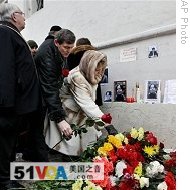Moscow
21 January 2009
The shooting deaths of a prominent attorney and an opposition journalist this week in Moscow add to a growing list of unsolved murders of Kremlin critics and human-rights advocates in Russia.
 |
| Russia's presidential human rights ombudsman, Vladimir Lukin, left, looks at the photos of Markelov and Baburova, where they were gunned down in Moscow, 20 Jan 2009 |
Markelov fought the early release from prison of Russian Colonel Yuri Budanov, who was serving a 10-year sentence for strangling a woman in 2000 during the war in Chechnya. Budanov claims she was a Chechen sniper, but the court rejected his defense. Some Russians consider Budanov to be a war hero.
Baburoba worked for Novaya Gazeta, an opposition newspaper, where journalist Anna Politkovskaya investigated human-rights abuses in Chechnya before she too was gunned down in 2006. Four men are on trial for her killing, but the triggerman and mastermind remain at large.
Novaya Gazeta journalist and spokesperson Nadezhda Prosenkova told VOA the newspaper employees are exposed to excessive risk merely for exercising their right to say what they believe. Prosenkova says one of the reasons behind that risk is a feeling in Russia that the state does not serve the people, but people serve the state, and that Russian leaders spread fear to stay in power.
Prosenkova says the problem is not so much lack of human decency, but fear of speech and action. She notes that people cannot articulate this fear, and wonder instead, "What if I do something that is not right, or if somebody does not like it?" She calls this a subconscious and diffuse fear, which is the most frightening thing about it.
The journalist says Russians should not just speak up for their rights, but shout their demands out loud.
But the few who dare are often silenced. In November, journalist Mikhail Beketov was beaten so severely in a Moscow suburb that skull fragments were driven into his brain and he remains in a coma. Beketov had reported about negligence of local officials. Similar crimes are reported across Russia, though some opposition activists merely get their tires slashed. Few perpetrators have been brought to justice.
Pro-Kremlin Member of Parliament Sergei Markov acknowledges excessive criminalization of Russian political, social, and economic relations. Markov traces the problem to what he calls the monstrous catastrophe of the 1990's in Russia. It was a decade of widespread street killings among rival political and economic groups, but also a period of unprecedented media independence that has since been curtailed.
Markov says Russia is still not able to rein in the monstrosities. But he says Russians are being told about a problem they know about all too well, and mostly by those who admire the catastrophe. He concludes that people who praise the 90's are those who most often talk about today's problems.
The head of Moscow's For Human Rights organization, Activist Lev Ponomarev, says Russia is a post-totalitarian state. He says many Russians maintain a totalitarian mentality that underpins much of the violence.
Ponomarev adds that Russians have always lived under a totalitarian regime and what is happening today is a natural historical progression. He says the human-rights community and political opposition try to resist, but that it is difficult, especially in light of what he calls renewed political terror.
Several murders or attempted murders of Kremlin critics have occurred abroad, but suspicions have fallen on Moscow.
Former KGB agent turned dissident Alexander Litvinenko was fatally poisoned in London. The face of Ukraine's pro-Western President, Viktor Yushchenko, was disfigured by dioxin poisoning in 2004. In October, opposition lawyer Karina Moskalenko, who has represented the family of Anna Politkovskaya, suffered mercury poisoning in Strasbourg, France. And this month, a Chechen dissident was shot dead in Vienna.
The European Union Presidency has issued a statement expressing condolences to the families and colleagues of Stanislav Markelov and Anastasia Baburova. The European Union is also calling for Russian authorities to ensure a thorough, prompt and impartial investigation and to bring all the perpetrators to justice. The French Embassy in Moscow released a similar statement, noting that the defense of human rights and free speech is a daily struggle in which Russian citizens continue to pay a heavy price.